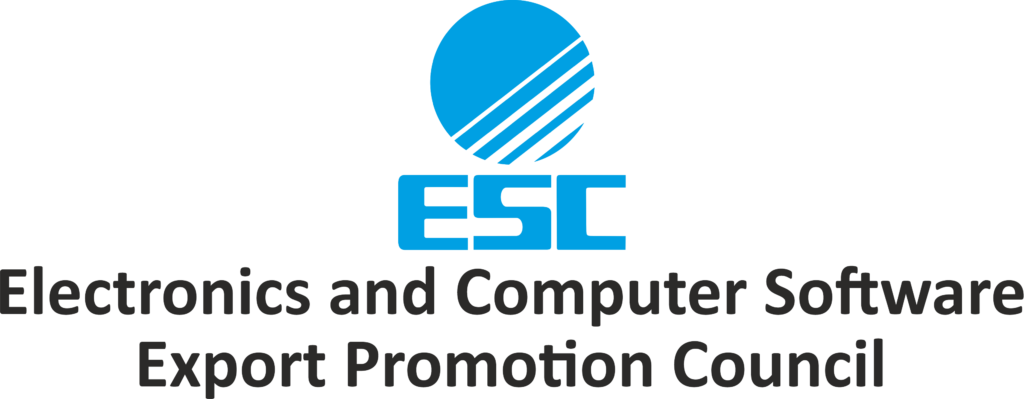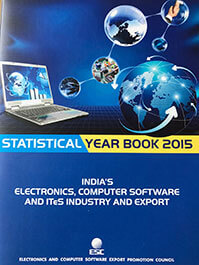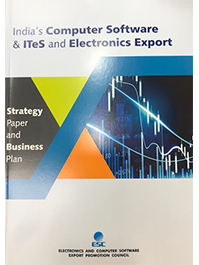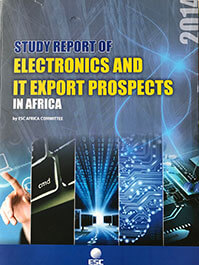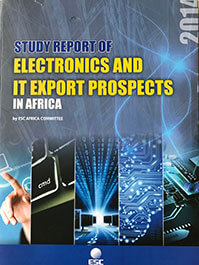POLICY INFO
Quick Links
- ANALYSIS OF THE UNION BUDGET 2023-24
- Highlights of Union Budget 2023-24
- Remission of Duties and Taxes on Exported Products (RoDTEP)
- e-Registration-Cum Membership Certificate (RCMC)
- Import Export Code (IEC)
- All Industry Duty Drawback Rates
- Certificate of Origin
- Useful Link
- Goods And Service Tax (GST) In India
- HS Codes
- How to Export & Import
- Incentive Schemes of MEITY
- Key Highlights for Foreign Trade Policy 2023
- DGFT notifies Foreign Trade Policy, 2023
- DGFT notifies the Handbook of Procedures, 2023
- Help Desk
ANALYSIS OF THE UNION BUDGET 2023-24
The Union Minister of Finance, Smt Nirmala Sitharaman tabled the Union Budget 2023-24 in Parliament on 1st February, 2023.
Analysis of ESC INDIA on Union Budget.
The budget contains several proposals to pep up ICT sector.
After hearing the budget 2023-24 proposals of the Finance Minister Smt. Nirmala Sitharaman, Shri Sandeep Narula, Chairman, Electronics and Computer Software Export Promotion Council informed that it is a positive Budget on many counts. The overarching principle of the Budget is that it is people-friendly since it increases the disposable income with ordinary people by way of tax cuts and exemptions. That will help higher spending by the households, leading to a boost in aggregate demand, a precondition to insulate the economy from the possible global slowdown.
Coming specifically on the ICT sector, ESC feels that the Budget proposals carry numerous measures that can give a critical push to the sector. Every major proposals such as focused attention on Artificial Intelligence, strengthening of the digital infrastructure, digital based green energy projects, skilling youth in the high technology segments, unprecedented focus on technology etc have a lot of takeaways for the ICT sector.
The third area that received considerable importance in the Budget proposals was the MSME sector and start-ups. Measures like rollover of the special treatments to start-ups for another one year, focus on fin-techs, reliefs to MSMEs, roll out of 5G and setting up of 5G labs, Digi locker scheme, specific measures to strengthen the digital infrastructure etc were steps in the right direction.
On the indirect tax proposals, ESC feels that reduction of customs duty on components of mobile phones, lithium based batteries, camera, open cell of TV panel etc. would go a long way in enhancing India’s export of the product. The Budget proposal to extend the same facilities to other electronic goods like TVs is a welcome step, which will boost exports.
The industry naturally expected the Budget would come out with a further package of production-linked incentives for the ICT sector. ESC feels that such schemes can be implemented even outside the Budget proposal and a further package for electronic components as a whole will be announced soon to accelerate both production and exports.
Key highlights of Budget related to electronics and IT sector are as under :-
Centres of Excellence for Artificial Intelligence:
For realizing the vision of “Make AI in India and Make AI work for India”, three centres of excellence for Artificial Intelligence will be set-up in top educational institutions. Leading industry players will partner in conducting interdisciplinary research, develop cutting-edge applications and scalable problem solutions in the areas of agriculture, health, and sustainable cities. This will galvanize an effective AI ecosystem and nurture quality human resources in the field.
Relief for MSMEs: In cases of failure by MSMEs to execute contracts during the Covid period, 95 per cent of the forfeited amount relating to bid or performance security, will be returned to them by government and government undertakings. This will provide relief to MSMEs.
Credit Guarantee for MSMEs: Last year, I proposed revamping of the credit guarantee scheme for MSMEs. I am happy to announce that the revamped scheme will take effect from 1st April 2023 through infusion of ` 9,000 crore in the corpus. This will enable additional collateral-free guaranteed credit of ` 2 lakh crore. Further, the cost of the credit will be reduced by about 1 per cent.
Fintech Services: Fintech services in India have been facilitated by our digital public infrastructure including Aadhaar, PM Jan Dhan Yojana, Video KYC, India Stack and UPI. To enable more Fintech innovative services, the scope of documents available in DigiLocker for individuals will be expanded.
Entity DigiLocker: An Entity DigiLocker will be set up for use by MSMEs, large business and charitable trusts. This will be towards storing and sharing documents online securely, whenever needed, with various authorities, regulators, banks and other business entities.
5G Services: One hundred labs for developing applications using
5G services will be set up in engineering institutions to realise a new range of opportunities, business models, and employment potential. The labs will cover, among others, applications such as smart classrooms, precision farming, intelligent transport systems, and health care applications.
Skill India Digital Platform: The digital ecosystem for skilling will be further expanded with the launch of a unified Skill India Digital platform for: enabling demand-based formal skilling, linking with employers including MSMEs, and facilitating access to entrepreneurship schemes.
PART B
Indirect Taxes
Indirect tax proposals aim to promote exports, boost domestic manufacturing, enhance domestic value addition, encourage green energy and mobility.
A simplified tax structure with fewer tax rates helps in reducing compliance burden and improving tax administration. I propose to reduce the number of basic customs duty rates on goods, other than textiles and agriculture, from 21 to 13.
Electronics
As a result of various initiatives of the Government, including the Phased Manufacturing programme, mobile phone production in India has increased from 5.8 crore units valued at about Rs. 18,900 crore in 2014-15 to 31 crore units valued at over Rs. 2,75,000 crore in the last financial year. To further deepen domestic value addition in manufacture of mobile phones, it is proposed to provide relief in customs duty on import of certain parts and inputs like camera lens and continue the concessional duty on lithium-ion cells for batteries for another year. Similarly, to promote value addition in manufacture of televisions, it is proposed to reduce the basic customs duty on parts of open cells of TV panels to 2.5 per cent.
Direct Taxes
Direct Tax proposals aim to maintain continuity and stability of taxation, further simplify and rationalise various provisions to reduce the compliance burden, promote the entrepreneurial spirit and provide tax relief to citizens.
MSMEs and Professionals :
MSMEs are growth engines of our economy. Micro enterprises with turnover up to ` 2 crore and certain professionals with turnover of up to
Rs. 50 lakh can avail the benefit of presumptive taxation. I propose to provide enhanced limits of Rs. 3 crore and Rs. 75 lakh respectively, to the tax payers whose cash receipts are no more than 5 per cent. Moreover, to support MSMEs in timely receipt of payments, it is proposed to allow deduction for expenditure incurred on payments made to them only when payment is actually made.
Start-Ups :
Entrepreneurship is vital for a country’s economic development. We have taken a number of measures for start-ups and they have borne results. India is now the third largest ecosystem for start-ups globally, and ranks second in innovation quality among middle-income countries. I propose to extend the date of incorporation for income tax benefits to start-ups from 31.03.23 to 31.3.24. It is proposed to provide the benefit of carry forward of losses on change of shareholding of start-ups from seven years of incorporation to ten years.
SOCIO-ECONOMIC WELFARE MEASURES
15% concessional tax to promote new manufacturing co-operative society
In order to promote the growth of manufacturing in co-operative sector, a new co-operative society formed on or after 01.04.2023, which commences manufacturing or production by 31.03.2024 and do not avail of any specified incentive or deduction, is proposed to be allowed an option to pay tax at a concessional rate of 15 per cent similar to what is available to new manufacturing companies.
Relief to start-ups in carrying forward and setting off of losses:
The condition of continuity of at least 51 per cent shareholding for setting off of carried forward losses is relaxed for an eligible start up if all the shareholders of the company continue to hold those shares. At present this relaxation applies for losses incurred during the period of 7 years from incorporation of such start-up. It is proposed to increase this period to 10 years.
Extension of date of incorporation for eligible start up for exemption :
Certain start-ups are eligible for some tax benefit if they are incorporated before 1st April, 2023. The period of incorporation of such eligible start-ups is proposed to be extended by one year to before 1st April, 2024.
CUSTOMS DUTY RATE CHANGES
Reduction in basic customs duty to reduce input costs, deepen value addition, to promote export competitiveness, correct inverted duty structure so as to boost domestic manufacturing etc [with effect from 02.02.2023]
|
Srl # |
Items |
Exist. BCD (%) |
Updated BCD (%) |
Notif./Finance Bill Clause |
|
1. |
Camera lens for camera module and Input/sub parts for lens of camera module (mobile phone) |
2.5 |
Nil |
Notification No. 6/2023, Serial No. 3 |
|
2. |
Parts for manufacture of open cells of TV panels |
5.0 |
Nil |
Notification No. 2/2023, Serial No. 33 |
|
3. |
Capital goods and machinery required for manufacture of lithium-ion cells for batteries used in electric vehicles |
7.5 |
Nil |
Notification No. 6/2023, Serial No. 2 |
|
4. |
Palladium Tetra Amine Sulphate for manufacture of parts of connectors |
7.5 |
Nil |
Notification No. 6/2023, Serial No. 1 |
|
5. |
Specified chemicals/items for manufacture of Pre-calcined Ferrite Powder |
7.5 |
Nil |
Notification No. 6/2023, Serial No. 17 |
Full details can be seen from the Annexure – I
Feedback Form
@ 2022 Copyright. All rights reserved.
